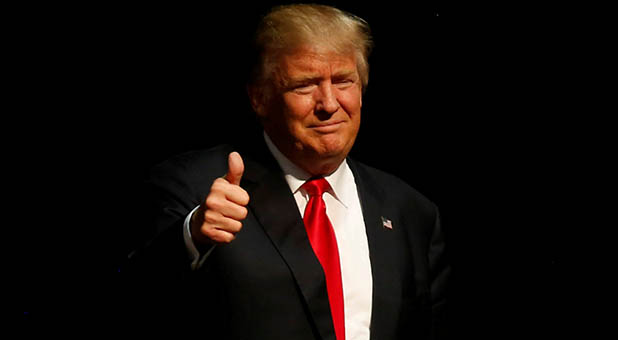How Does Donald Trump’s Economic Plan Stack Up?
In the history of American politics, there has never been a candidate quite like Donald Trump. He is an Ivy League-educated New York billionaire appealing to populists across the country. He is a crony capitalist who loves bureaucracy and yet has convinced voters that he is the anti-Establishment candidate. He is profoundly ignorant about economics and openly hostile to freedom, and yet on the verge of securing the nomination of what was once the America’s “conservative” party.
He is, as he claims, a sort of artist.
Yet for all his contradictions, understanding Trump is rather simple. The first step is to understand that he cares less about principles or policy than he does about process.
Trump brags that he is not a politician. In many ways, this is true. Many politicians are concerned primarily about their political principles and are not all that interested in the details of government policies. They tend to rely on outsiders (such as think-tanks) to help them choose fitting policies that align with the principles. Some other politicians believe that policies and principles are all but inseparable. They tend to be “policy wonks” that pay close personal attention to the details of government policies.
While Trump may have some non-negotiable principles and even some policies that he cares about, his primary concern is not with either principles or policies—he cares about the process. And the one process he deeply cares most about—the one that almost defines his personality—is deal-making. Trump thinks that he is an artist and that deals are his art form.
In the opening line of his book, The Art of the Deal, Trump writes:
I don’t do it for the money. I’ve got enough, much more than I’ll ever need. I do it to do it. Deals are my art form. Other people pain beautifully on canvas or write wonderful poetry. I like making deals, preferably big deals. That’s how I get my kicks.
Trump thinks he is the Michelangelo of “deals.” If you do not understand that fact, you will never understand Trump, and you will always be confused by his actions.
Even those of us who recognize this fact, however, can have a difficult time processing what it means because we do not consider deals to be an art form. We can appreciate (if not truly comprehend) the singular focus on music by Beethoven, or painting by Rembrandt. But the idea that anyone could be obsessed by deals is completely foreign to us. We think, “Surely, there must be more to it.” But there isn’t. For Trump, it really is all about “the deals.”
As Scott Alexander says in his recent review of The Art of the Deal:
[T]here’s still something alien about Trump here, even moreso than with the populist demagogue of the campaign trail. Trump the demagogue is attacked as anti-intellectual. I get anti-intellectualism because – like all isms – it’s an intellectual idea, and I tend to think in those terms. But Trump of the book is more a-intellectual, in the same way some people are amoral or asexual. The world is taken as a given. It contains deals. Some people make the deals well, and they are winners. Other people make the deals poorly, and they are losers. Trump does not need more than this. There will be no civilization of philosopher-Trumps asking where the first deal came from, or whether a deal is a deal only by virtue of its participation in some primordial deal beyond material existence. Trump’s world is so narrow it’s hard to fit your head inside it, so narrow that on contact with any wider world it seems strange and attenuated, a broken record of deals and connections and hirings expanding to fill the space available.
On the other hand, he made a billion dollars and will probably win the GOP nomination. So there’s that.
To understand Trump we must see him as he sees himself: as the greatest solo deal-maker in modern history, if not in all of human history. Trump is a deal-maker, and his focus is not on consistency in principle or coherence in policy-making, it’s in securing deals.
But who exactly is he making deals with? Currently, there are three main deals he has on the table. He’s making deals with primary voters, GOP leaders (who his supporters consider “the Establishment”), and the Democratic Party.
Of the three groups, Trump cares the least about primary voters. As he’s said before, his supporter have a cult-like devotion to him that he can all but take for granted. He doesn’t really need to woo them, but he needs their support to secure a better deal with the Republican establishment. And to his credit, it’s working. The problem is that many of his supporters don’t realize (or simply don’t care) that they are nothing more than a bargaining cheap in a side deal with the Establishment.
For better or worse, Trump has no intention of actually implementing many of the promises he has made to his supporters. He’s been rather open and honest about that fact, pointing out that he’s mostly exaggeration to secure a better deal later on. He also believes his supporters don’t really care about principles or policies either. Primary voters had 15 other candidates—all of whom cared more about policy and principle than Trump—and rejected them all for the Deal-Making Artist.
To get elected, he believes, he doesn’t need to sell his policies he just needs to sell himself by getting voters excited about his abilities as a deal-maker. If that requires a bit of exaggeration, then so be it. As he wrote in The Art of the Deal:
The final key to the way I promote is bravado. I play to people’s fantasies. People may not always think big themselves, but they can still get very excited by those who do. That’s why a little hyperbole never hurts. People want to believe that something is the biggest and the greatest and the most spectacular.
I call it truthful hyperbole. It’s an innocent form of exaggeration—and a very effective form of promotion.
Using hyperbole to gain support of the voters, though, is merely the first step. What he really wants is the backing of the Republican leadership.
Although he isn’t winning over the true believers who embrace economic freedom and small government, Trump is proving he can appeal to the Establishment. Within the last few weeks former House speaker John Boehner and former Vice President Dick Cheney have announced they will support him if he gets the nomination. Most other Establishment leaders have too and others will surely follow. They recognize that Trump is someone they can work with. He is, after all, like them: a deal-maker.
Which brings us to the third deal on the table: Trump is trying to close a deal with liberal Democrats.
Most candidates wouldn’t even hint that they are willing to compromise with liberal Democrats in the general election, much less months before they’ve even secured the Republican nomination. But for many reasons, it is not surprising that Trump would be reaching out to them now.
For most of his life, Trump was registered as a Democrat (he has has changed his party affiliation five times since registering as a Republican in Manhattan in 1987). He’s donated to the political campaigns of liberal Democrats, including to his new rival, Hillary Clinton. On many issues, he takes positions that are far to the left of the Republican mainstream.
Yet despite his life-long allegiance to liberalism, it’s still surprising to hear him claim he will be adopting the message of a self-proclaimed socialist. A few weeks ago, Trump said on MSNBC, “Bernie Sanders has a message that’s interesting. I’m going to be taking a lot of the things Bernie said and using them.”
So what does that mean? In the next post we’ll look more closely at some of the leftist economic issues that Trump is proposing to adopt. {eoa}
Joe Carter is a Senior Editor at the Acton Institute. Joe also serves as an editor at the The Gospel Coalition, a communications specialist for the Ethics and Religious Liberty Commission of the Southern Baptist Convention, and as an adjunct professor of journalism at Patrick Henry College. He is the co-author of How to Argue like Jesus: Learning Persuasion from History’s Greatest Communicator (Crossway).







































